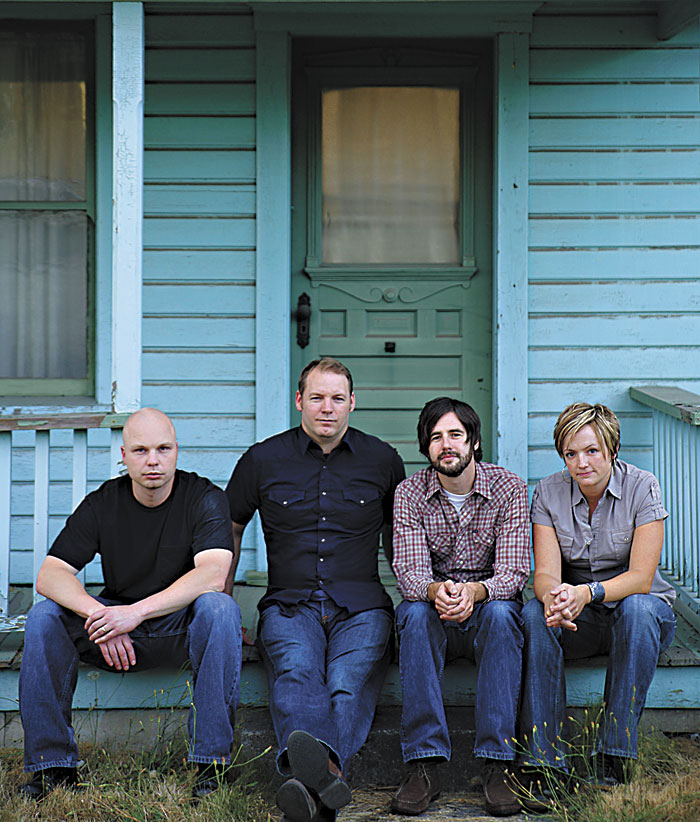There are few stretches of Seattle that hold as much stubborn and evocative sway as Aurora Avenue North, aka Highway 99. Even during the march of gentrification that swept the city, Aurora had surprisingly few casualties (the most notable and unfortunate being the loss of the legendary Twin Teepees restaurant), and remains dotted with time-warped diners, pawn shops, rundown used car lots, and seedy motels filled with perpetually lost souls. In the path of a certain gaze, it’s an eyesore in need of sterilization or demolition; in the eyes of someone like local filmmaker and musician Andy McAllister, it’s a revelation of twisted charm, class history, and a rich local wellspring of inspiration for an artist whose work is driven by character studies.
McAllister currently works as a freelance film editor and fronts Conrad Ford, a hushed and ghostly Americana outfit cut from the same vintage fabric as Barton Carroll and Jesse Sykes. Though he was born and raised in Seattle, it took a detour to Austin, Texas, and the creative exhaustion from working on films full-time ultimately led him back toward music, something he originally became involved with in junior high.
“I went to Catholic school, so I was really into Van Halen,” he explains, as if VH appreciation was a compulsory element of parochial schooling. “My older brother was this totally cool metalhead rocker guy [who also played in now-defunct Seattle band Medicine Hat], but I was pretty awful on the guitar at that time, and I was always in the shadow of this really amazing guitar guy.” After high school, McAllister began dabbling in film, eventually writing and directing the Clerks-esque indie Shag Carpet Sunset in 2002, shortly before moving with his grad school–bound girlfriend to Austin.
“That’s where I got bit by all things country and all things Austin. I was really into Townes Van Zandt and Daniel Johnston,” he recalls. The unemployed McAllister spent much time engrossed by the local music scene, and frequently hung out at the Continental, a warmly gritty club on South Congress that he appreciated for its frequent free shows and $1 Lone Star beer specials. “That’s where I really started writing songs,” he says.
He returned to Seattle in 2005, and was weary of re-entering the film business simply because it had proved to be exceptionally draining financially and emotionally. Still, the power of a grant from 911 Media and the pull of a lifelong interest in making a film about Highway 99 were too strong to resist. “[Driving through] there as a kid had a really big effect on me. I love that area and always wanted to make a film about it.” The result was Urban Scarecrow, a sordid and sorrowful tale about an aimless young man and his widowed, wannabe comedian father barely scratching out an existence under the sagging roof of an Aurora hotel.
The film was accepted to a number of prestigious film festivals (including our own Seattle International Film Festival and the Austin Film Festival), but McAllister knew he needed to find a less treacherous avenue into the industry and a way to execute the songs he’d been sketching in his mind since Austin. “It just got so expensive, and I’d go through this cycle of completely exhausting myself,” says McAllister. “I made two films and pretty much had a breakdown on both, not treating my body well or being very healthy. So I started writing songs as little mini-movies. There are so many things I couldn’t do [visually] with the 99 movie because of budget restrictions, but with songs I could explore much more. It was a natural transition and a lot more fulfilling.” He began picking up less taxing freelance work as a film editor, soon making a more practical living cutting commercials and documentaries.
Now a markedly improved guitar player in possession of a voice strongly reminiscent of Beck, McAllister connected with musician and engineer Jordan Walton, who had previously worked with literate troubadours like Damien Jurado and J. Tillman. “He played pedal steel and banjo and sang three notches above me, so he had [a lot to contribute],” he says of Walton. The duo released their debut, Don’t You Miss Yourself, in 2006, taking the name “Conrad Ford” from the compounded names of cinematographer Conrad Hall and director John Ford.
They soon added more players to their lineup, including McAllister’s multitalented cousin, April Sather, who contributes shimmering washes of Wurlitzer, melodica, glockenspiel, accordion, and trumpet to the mix, while drummer Nathanael Butler adds the dry shuffle of brushed drums and other percussive elements to deepen the mystery. Secret Army (Tarnished Records), their recently released sophomore effort, is a disturbingly beautiful and absorbing collection of songs about aimless travelers, fugitive felons, and an array of margin-dwelling characters as romantically motivated as they are morally suspect. Conrad Ford’s (ahem) cinematic live shows have resulted in the band opening for a number of notable artists, including Clem Snide’s Eef Barzelay, former Drive-By Trucker Jason Isbell, and Firewater. You can catch them this Sunday, Nov. 23, when they open for twang-tinged garage siren Holly Golightly at Chop Suey.








